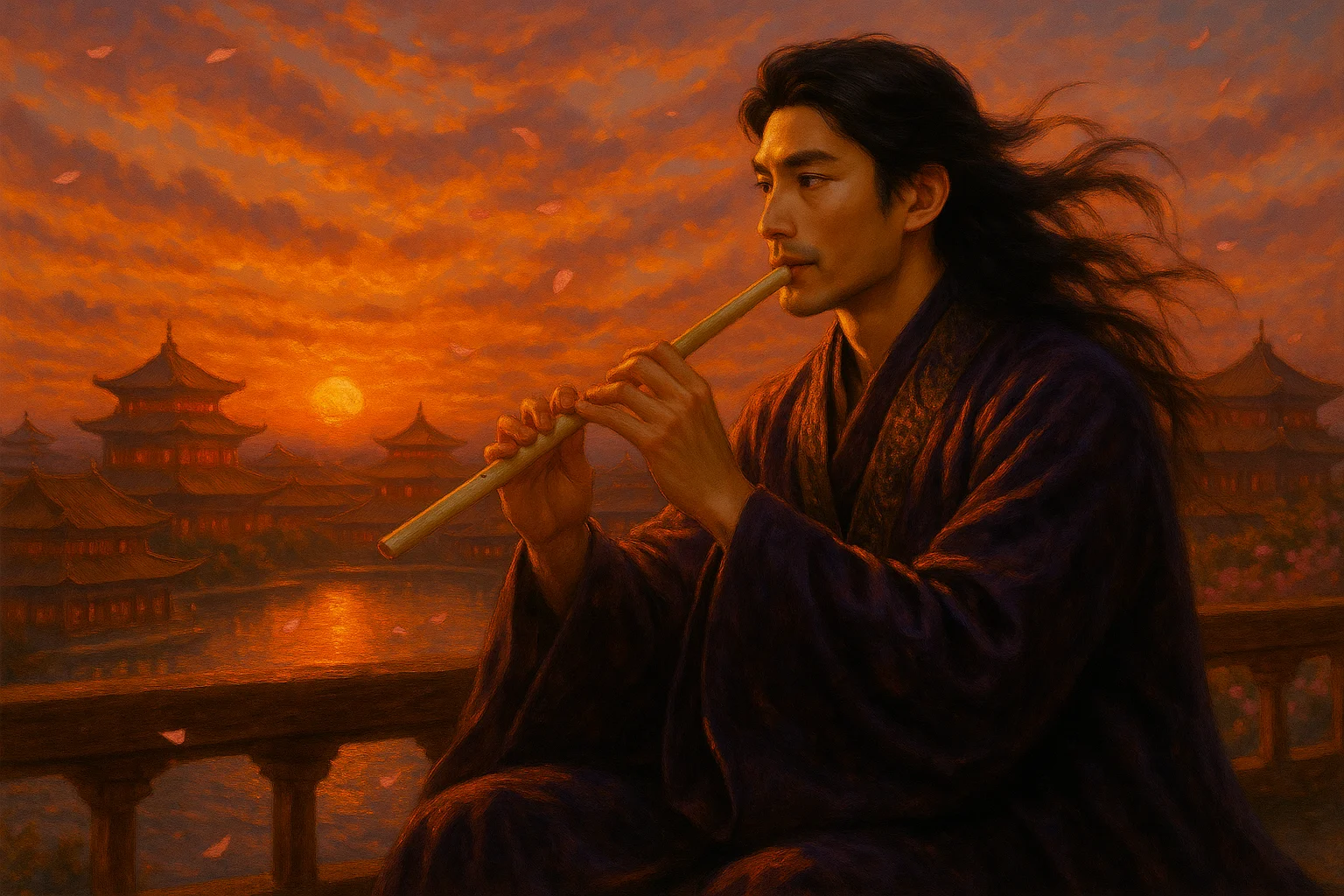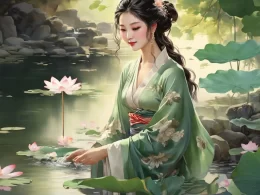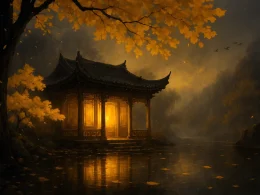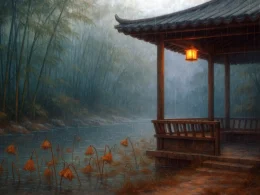The blue sea is waveless, the jade terrace in view;
Thinking of this, we should have flown there, we two.
How lightly I parted from my love then!
Now mountains and streams keep us apart.
Where is she now? O where?
The gorgeous mat is covered with dust;
Her fragrant bower veiled in mist.
To whom can I give the love words I’ve penned?
From the high tower I gaze till it’s dark.
On plane leaves fall rustling drops hard to heark.
Original Poem
「踏莎行 · 碧海无波」
碧海无波,瑶台有路。思量便合双飞去。
当时轻别意中人,山长水远知何处。绮席凝尘,香闺掩雾。红笺小字凭谁附。
晏殊
高楼目尽欲黄昏,梧桐叶上萧萧雨。
Interpretation
This lyric was composed in 1027 during Yan Shu's political exile. Having opposed the powerful minister Zhang Qi's promotion to head the Bureau of Military Affairs and subsequently offended the emperor with untoward remarks at the Jade Purity Temple, Yan Shu was demoted to govern Xuancheng. Written during this journey of disgrace, the poem transforms personal sorrow into landscape imagery, expressing complex emotions of regret, longing, and resignation.
First Stanza: "碧海无波,瑶台有路。思量便合双飞去。当时轻别意中人,山长水远知何处。"
Bì hǎi wú bō, yáo tái yǒu lù. Sīliang biàn hé shuāng fēi qù. Dāngshí qīng bié yìzhōng rén, shān cháng shuǐ yuǎn zhī hé chù.
The azure sea lies calm without waves, / The jade terrace's path lies clear— / Had I but thought, we should have flown there together. / That casual parting from my beloved— / Now mountains and rivers divide us, who knows where she dwells?
The stanza unfolds as lyrical retrospection. The unimpeded paths to mythical realms ("jade terrace") contrast painfully with the irreversible human separation. The pivotal phrase "casual parting" (轻别) encapsulates the poet's remorse, while the unknowable distance ("who knows where") transforms personal regret into universal longing.
Second Stanza: "绮席凝尘,香闺掩雾。红笺小字凭谁附。高楼目尽欲黄昏,梧桐叶上萧萧雨。"
Qǐ xí níng chén, xiāng guī yǎn wù. Hóng jiān xiǎo zì píng shuí fù. Gāo lóu mù jìn yù huánghūn, wútóng yè shàng xiāoxiāo yǔ.
Our brocaded mats gather dust now, / Her fragrant chamber veiled in mist— / These crimson-papered words in tiny script, to whom shall I entrust them? / From the high tower I gaze till twilight falls, / Only to hear autumn's whisper— / The ceaseless rain on parasol leaves.
Here the present emerges as a landscape of abandonment. Material traces of past intimacy—dust-covered mats, obscured chambers, undelivered letters—become objective correlatives for irretrievable connection. The concluding rain on wutong leaves (traditionally associated with autumn sorrow) masterfully externalizes inner desolation, its endless "whisper" embodying unspoken grief.
Holistic Appreciation
Centered on the theme of "parting sorrow," this lyric poem unfolds with clear structure—beginning with reminiscence and ending in tangible reality, creating a harmonious interplay of reflection and immediacy. The first stanza moves from the idealized vision of "flying side by side" to the regret of "lightly parting from a beloved," tracing a psychological shift from hope to remorse. The second stanza builds from environmental details, intensifying the void of unfulfilled longing. The poet’s technique is subtle and restrained, yet profound in emotion, masterfully embedding feelings of regret, attachment, yearning, and resignation into the scenery. All culminates in the final line’s "rain rustling on wutong leaves," where unspoken emotions speak volumes.
Notably, though likely improvised for banquet performances, this poem is far from frivolous—it is sincere in sentiment, elegant in tone, and rich in artistic allure.
Artistic Merits
- Fusion of Scene and Emotion, Feeling Embodied in Nature: The closing line, "rain rustling on wutong leaves," is a masterstroke. Beyond evoking parting’s melancholy, it dissolves inner anguish into the autumn rain’s desolation, offering vivid imagery and emotional resonance.
- Delicate Conception, Meticulous Layering: The poet first establishes the ideal of "flying together," then twists it into the ache of "casual separation," structurally escalating the emotion with natural progression.
- Refined Language, Lofty Ambience: Allusions (e.g., "Jade Terrace") feel organic; the diction is polished and graceful, reflecting Yan Shu’s signature clarity and elegance.
Insights
This poem warns that "lightly parting" in life may lead to irreparable regret—a momentary lapse could mean eternal loss. In matters of the heart, cherish the present and weigh decisions carefully. Moreover, the poet’s indirect yet profound expression teaches us: sometimes restraint moves more deeply than bluntness. In literary creation, writing emotion through scenery and embedding feeling in objects is where enduring fascination lies.
Poem Translator
Xu Yuanchong (许渊冲)
About the Poet

Yan Shu (晏殊 991 – 1055) Originaire de Fuzhou dans le Jiangxi, Yan Shu fut le maître fondateur de l'école wanyue (élégante et retenue) de la poésie ci sous les Song du Nord. Enfant prodige entré dans l'administration à quatorze ans, ses ci allient noblesse classique et méditation philosophique dissimulée sous des évocations de prospérité raffinée. Mentor de talents comme Fan Zhongyan et Ouyang Xiu, il initia l'École du Jiangxi en poésie ci et posa les bases de l'épuration du genre sous les Song.












